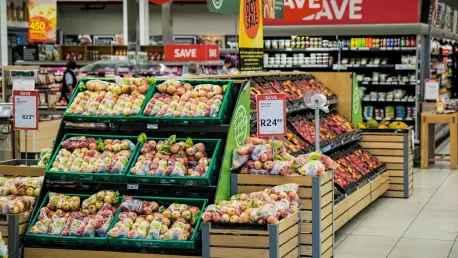In the fast-paced world of grocery retail, where customer expectations for fresh, high-quality food continue to rise, one California-based Hispanic grocery chain is making waves with its innovative approach to meeting these demands. Vallarta Supermarkets, headquartered in Pacoima, has taken a bold step forward by integrating cutting-edge technology into its fresh food operations. With a network of 61 stores across multiple California counties and a workforce of over 8,000 team members, this retailer has positioned itself as a leader in the industry. By adopting advanced tools to streamline production and inventory management, Vallarta is not only enhancing operational efficiency but also redefining how fresh food is delivered to consumers. This transformation highlights a broader shift in the grocery sector toward data-driven strategies and automation, setting a new standard for quality and consistency in a competitive market.
Pioneering Fresh Food Innovation with Advanced Tools
Vallarta Supermarkets has emerged as a trailblazer by being among the first to implement a comprehensive Fresh Item Management suite developed by a leading technology provider. This suite incorporates artificial intelligence and machine learning to revolutionize forecasting and production planning. Features such as recipe and nutrition management, grind and yield oversight, and scale integration allow for precise control over food preparation processes. A significant upcoming addition, a tablet-based app named Cookbook, is slated for rollout in the third quarter of this year. This digital tool will replace outdated paper recipe books with interactive, step-by-step guides, ensuring uniformity and accuracy in every dish prepared. By centralizing operations through a unified platform, Vallarta eliminates fragmented workflows, enabling real-time data access that minimizes guesswork. This focus on technology empowers store associates to prioritize execution and customer interaction over manual tracking, ultimately elevating the shopping experience.
The impact of these technological advancements on Vallarta’s operations is profound, particularly in terms of efficiency and customer satisfaction. By leveraging AI-driven insights, the chain has optimized inventory management, ensuring that fresh products are available when customers need them most. This system also supports better decision-making by providing visibility into production needs, reducing overstock and shortages alike. A notable outcome is the significant decrease in product waste, often referred to as “pitch,” alongside a drop in excess donations, reflecting a more sustainable approach to food handling. Enterprise-wide performance compliance has also seen marked improvement, demonstrating how integrated systems can align operations across multiple locations. Vallarta’s commitment to using technology to meet consumer expectations showcases a model that other retailers might emulate, proving that innovation can drive both profitability and loyalty in a sector where freshness is paramount.
Industry Trends and the Shift to Data-Driven Retail
The adoption of technology by Vallarta Supermarkets mirrors a larger trend within the grocery retail industry, where automation and data-driven strategies are becoming indispensable for managing fresh food offerings. As consumer demand for transparency and quality grows, retailers are increasingly turning to intelligent systems to enhance visibility across their supply chains. Vallarta’s transition from disjointed, manual processes to a connected platform exemplifies this shift, offering a blueprint for how technology can address longstanding challenges like waste reduction and inconsistent product quality. Industry leaders have noted that standalone production systems often fall short, whereas integrated solutions provide the cohesion needed to ensure consistent, high-quality output. This approach not only streamlines internal processes but also builds trust with customers who prioritize freshness and reliability in their shopping choices.
Beyond operational improvements, Vallarta’s tech-driven strategy underscores the importance of adaptability in a competitive market. The ability to harness real-time data for forecasting and planning allows the chain to respond swiftly to changing consumer preferences and seasonal demands. This agility is critical in maintaining a competitive edge, especially in the fresh food segment where margins can be tight. Feedback from Vallarta’s leadership highlights how technology brings structure to complex operations, offering clarity that was previously unattainable with traditional methods. The emphasis on a connected workforce platform ensures that every team member, from store associates to management, operates with the same accurate information, fostering a unified approach to service delivery. As more retailers recognize the value of such systems, Vallarta’s early adoption positions it as a forward-thinking player, paving the way for broader industry transformation over the coming years.
Reflecting on a Tech-Forward Legacy
Looking back, Vallarta Supermarkets’ journey with technology demonstrates a remarkable commitment to enhancing fresh food delivery through innovative solutions. The integration of AI and machine learning tools reshaped how inventory and production were managed, setting a benchmark for efficiency across its extensive store network. Reduced waste and improved product consistency became hallmarks of this transformation, reflecting a dedication to both sustainability and customer satisfaction. Moving forward, the focus should remain on scaling these advancements, exploring further refinements to digital tools like the Cookbook app, and adapting to emerging consumer trends. Other retailers might consider similar investments in connected platforms to stay competitive, while Vallarta could lead by sharing insights on balancing technology with the human touch that defines grocery retail. This legacy of innovation offers a clear path for the industry to prioritize quality and efficiency in equal measure.









